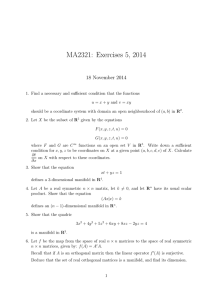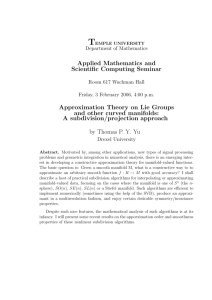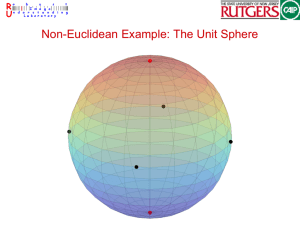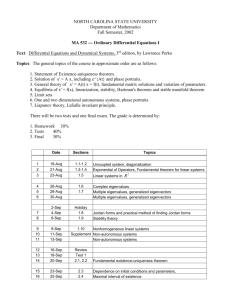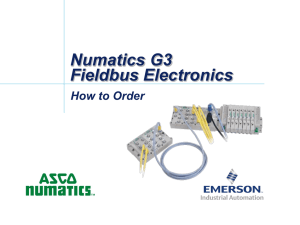()-SASAKIAN
advertisement
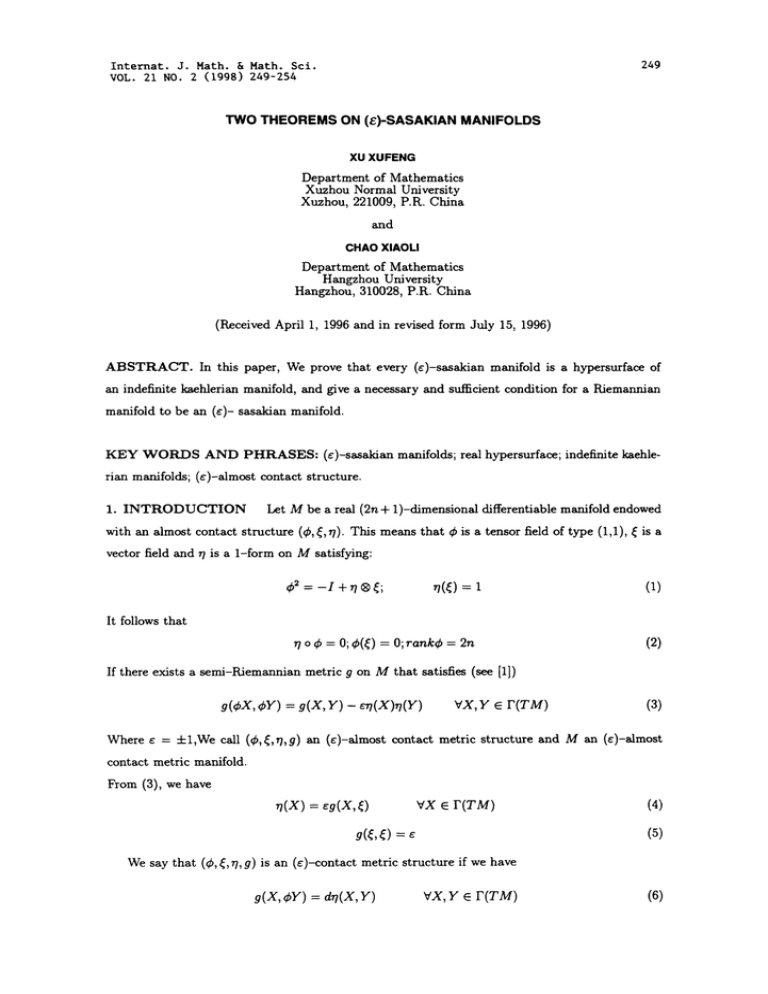
249
Internat. J. Math. & Math. Sci.
VOL. 21 NO. 2 (1998) 249-254
TWO THEOREMS ON ()-SASAKIAN MANIFOLDS
XUXUFENG
Department of Mathematics
Xuzhou Normal University
Xuzhou, 221009, P.R. China
and
CHAO XIAOLI
Department of Mathematics
Hangzhou University
Hangzhou, 310028, P.R. China
(Received April 1, 1996 and in revised form July 15, 1996)
ABSTRACT. In this paper, We prove that every (e)-sasakian manifold is a hypersurface of
an indefinite kaehlerian manifold, and give a necessary and sufficient condition for a Riemannian
manifold to be an
(e)- sasakian manifold.
KEY WORDS AND PHRASES: ()-sasakian manifolds; real hypersurface; indefinite kaehlerian manifolds; (e)-almost contact structure.
Let M be a real (2n + 1)-dimensional differentiable manifold endowed
with an almost contact structure (, f,7). This means that is a tensor field of type (1,1), f is a
vector field and r/is a 1-form on M satisfying:
1.
INTRODUCTION
2
-I + r/(R) f;
7()
(1)
1
It follows that
r/o
0; ()
0; rank
If there exists a semi-Riemannian metric g on M that satisfies (see
g(X, CY)
Where
g(X, Y)
erI(X)(Y)
(2)
2n
[1])
VX, Y E F(TM)
(3)
+l,We call (,,v/,g) an (s)-almost contact metric structure and M an (e)-almost
contact metric manifold.
From (3),
we have
(X)
g(X,)
VX e F(TM)
(4)
(5)
We say that (, f, r/, g) is an (e)-contact metric structure if we have
g(X, CY)
dq(X, Y)
VX, Y e F(TM)
(6)
X. XUFENG AND C. XIAOLI
250
In this case, M is an (e)-contact metric manifold. An ()-contact metric structure which is normal
is called an ()-sasakian structure. A manifold endowed with an ()-sasakian structure is called
an ()- sasakian manifold.
In[1], A. Bejancu and K.L. Duggal give a theorem as following:
THEOREM A (see [1] theorem 6)
Let M be an orientable real hypersurface of an indefinite kaehlerian manifold
then the
,
following assertions with respect to the (e)-almost contact metric structure inherited by M are
equivalent:
(1) M is an (e)-sasakian manifold
(2) The (e)-characteristic vector field satisfies
Vx -X
VX
F(TM)
(3) The shape operator A satisfies
-X + ( + rI(A))v(X)
AX
This produces a problem whether an
some indefinite kaehlerian manifold.
()-
VX
F(TM)
sasakian manifold must be a real hypersurface of
In sec.2, we prove that the answer to this problem is positive.
that is
THEOREM 1.1. Every ()-sasakian manifold must be
a real
hypersurface of some indefinite
kaehlerian manifold.
In [2], Hatakeyama, Ogewa and Tanno give the condition for a Riemannian manifold to be a
K-contact manifold, they prove
THEOREM B (see [2] or [4]) In order that a (2n + 1)-dimensional Riemannian manifold M is
K-contact, it is necessary and sufficient that the following two conditions are satisfied:
(1) M admits a unit killing vector field f;
(2) The sectional curvatures for plane sections containing f are equal to
In sec.3,
we generalize Theorem
t every point of M.
B by giving the necessary and sufficient condition for a Rie-
()- sasakian manifold, that is
THEOREM 1.2. In order that a (2n + 1)-dimensional Riemannian manifold M is ()-sasakian
mannian manifold to be an
manifold, it is necessary and sufficient that the following three conditions are satisfied:
(1) M admits a unit killing vector field f;
(2) The sectional curvature for plane sections containing f are equal to
or -1 at every point on
M.
VX, YJ_
(3) R(X, Y){ 0
2. THE PROOF OF THEOREM 1.1
Let M be a (2n + 1)-dimensional (e)-sasakian manifold with (e)-sasakian structure (, f, r/, g).
then vector
Let P be real line with coordinate and unit tangent vector d Denote M x R by
fields on
are given by
X (X,f),’ (Y,h),...,
.
THEOREMS ON SASKAKIAN MANIFOLDS
Where
X, Y
are vector fields tangent to
linear map J on the tangent space of
are function on
M,
we define a
[5]
d
JX
From (1) and (2),
by
M and f, h,...,
251
d
J(X,f-)
(X- ff, ri(X)-)
(7)
we have
d
d
J-X J(X- f,(x))
-x
(x- (x),-f )
,
It shows that J is almost complex structure on M, but M is an (e)-sasakian manifold, this means
thus -=M x R is a complex manifold.
N(J) O, then J is a complex structure on
Let
r"
M=M x R
M be the projection map, we introduce a metric G on M by
G
As an induced metric of g,
ea(r "g + edt (R) dt)
we have
((x, 0), (Y, 0))
For any vector fields X=
(8)
(x, Y)
(X,f),7 (Y, h)on
,
(
(9)
0)
we obtain from
(7)(8)
G(X, 7) e"(g(X, y) + h)
(10)
GCJX, ) ea(gCCX, Y) efrl(Y) 4- ehrl(X)
G(-, J) eaCgCX, CY) ehrlCX 4- efrlCY))
(11)
d
G(J, J’)
G((X f’,/(X)), (Y
eaCg(X, CY) 4- efh 4-
(2)
d
h,r(Y)))
(13)
From (10)-(13),we
GCJX, J) G(X, )
G(X, J) -G(J, ),
Thus G is a Hermitian metric on M.
Define a 2-fore on M by
(14)
using r* o d
d o r’, we get
de
eeadt A (r’dr
+ edt A r’rl)) +
eet[Tr’d2rl + edt ^ (r’rl)
therefore,
is a closed 2-form on
(-X,Y)
edt
^ r’dl]
M, by a direct computation,
d
0
(15)
we get
d
((X,f-),(Y, h dr))
ea(dri(X, Y) + e(dt ^ ’ri)(-X, 7))
eaCdri(X, Y) + lrlCY) hl(X))
(16)
X. XUFENG AND C. XIAOLI
252
From (12) and (16)
we see that
(Y, 7) c(X, J7)
(7)
(17), we know,the (I) defined by (14) is the closed fundamental 2-form, thus
the G defined by (8) is an indefinite kaehlerian metric on
and hence M
M x R is an
Then from (15) and
indefinite kaehlerian manifold.
3. THE PROOF OF THEOREM 1.2
First of all, we state some results which we shall need later.
LEMMA 3.1. (see [1] p. 548). An (e)-almost contact metric structure (,,v/,g) is ()-sasakian
if and only if
(Vx)Y
Where
g(X, Y),
gX, Y e F(TM)
rI(Y)X,
(18)
is the Levi-civita connection with respect to g.
If we replace Y by
in
(18) and from (1) (2) we get
Vx5
vX e F(TM)
-eCX
(19)
Because
(Lg)(X, Y)
g(X, Y)
g([, X], Y) g(X, [, Y])
g(X, Y)
g(X
(fg(X, Y)
x, Y)
g(vX, Y)
g(X, Y
VY)
g(X, vY + g(Vx,, Y) + g(X,
(Vg)(X, Y) + g(Vx, Y) + g(X,
g(-eCX, Y) + g(X,
-(g(X, Y) + g(X, CY))
VX, Y E F(T/)
0
Then we get
PROPOSITION 3.1. The characteristic vector field f on
an
()-sasakian manifold is a killing
vector field.
-
LEMMA 3.2.([6] p.265) Let M be a contact metric manifold with contact metric structure
(, r/, g). Then N (3) (L)X vanishes if and only if is a killing vector field with respect to g.
PROPOSITION 3.2. Let M be an (e)-sasakian manifold, then the sectional curvature for
,
plane sections containing
,
are equal to 1 or -1 at every point on
PROOF. Let X be an unit vector field on M and X
-
_L
M.
then from
(19)
v (x) + ([, x])
-(v(x) (vx Vx))
-((v)x + (Vx))
From Lemma 3.1,
we get
(v)x
a(,x) (x)
o
we have
253
THEOREMS ON SASKAKIAN MANIFOLDS
thus we have
R(,X)
-X
-(x)
-X
then
--
g(R(,X)X,)
From (18) and (19), let any X,Y
6
F(TM) and X,Y 2-
xY
R(X,Y)
-g(R(,X),X)
+/-1
we have
Yx
Vy(-eCX) + e[X, YI
Vx(-eCY)
e((Vy)X-
(9(X, Y) e’q(X)Y g(X, Y) + e’q(Y)X)
rl(Y)X rl(X)Y
o
Then, by Proposition 3.1; 3.2, we get the necessary condition of Theorem 2.
Conversely, first, we define a 1-form r and a tensor field of type (1.1) by
(x)
vx
CX
(x,o
We know from [4] (, ,/,g) be an almost contact metric structure, satisfying
2 -I+ (R),
,
Let
er/,
.
(x, CY)
g(X, CY)
Cg,
g(X, Y)
cx
(x, ),
2= _i +/(R),
,
rI(X)i(Y)
then
,(x)
.(X, CY)
(X, CY)
#(X, Y)
d,(X, Y)
-
Vx
d(X, Y)
e(X)O(Y)
(e)--contact metric structure.
Now we show that N (1) 0, from condition (3) of Theorem 2, we obtain
thus
VX, Y 2.
(Vx)Y (rye)X,
Thus (, #, 9) be an
,
[, el(X, Y)
N(X, Y)
(Vcx)Y- (Vy)X + [(Vy)XVX, Y 2(Vx)Y- (Vy)X
By using Lemma 3.1,
we
get
N,(X,Y)
-29(X, CY)
then
N O) (X, Y)
No(X, Y) + 20(X, CY) 0
254
If X
_k
,
X. XUFENG AND C. XIAOLI
we have by
Lemma 3.2
N(1)(X, ) N(X, ) e(L)X
Thus, for any vector field X, Y on M N(1)(X, Y) 0
, ,
0
Hence, the (e)-contact metric structure (, }, .) is normal, that is, M is an ()- sasakian manifold
with an (e)-sasakian structure (, /, ).
Theorem 2 can be improved.
THEOREM 2’. In order that
a
_
(2n + 1)-dimensional Riemannian manifold M
is
(e)-sasakian
manifold, it is necessary and sufficient that the following two conditions are satisfied
(1) M admits a unit killing vector field
VX, Y F(T/)
(2) R(X, Y) rI(Y)X 7(X)Y
References
[1] BEJANCU, A.
and
DUGGAL, K.L., Real hypersurface of indefinite kaehlerian manifolds,
16(1993), 545-556.
Internat. J. Math.& Math. Sci.
[2] HATAKEYAMA, Y., OGEWA, Y. and TANNO, S., Some properties of manifolds with certain
metric structure, Tohoku Math. J. 15(1963), 42-48.
[3] KOBAYASHI, S. and NOMIZU, K.,
Foundations of differential geometry, vol.II
(1969).
[4] BLAIR, D.E., Contact manifolds in Riemannian geometry, Springer, Lecture Notes in Math.
vol.II 509(1976).
[5] SASAKI, S. and HATAKEYAMA, Y., On
differentiable manifolds with certain structure
which are closely related to almost structure, ,ibid
[6] YANO, K.
13(1961), 281-294."
and KON, M., Structure on manifolds, world scientific,Singapore, 1984.
